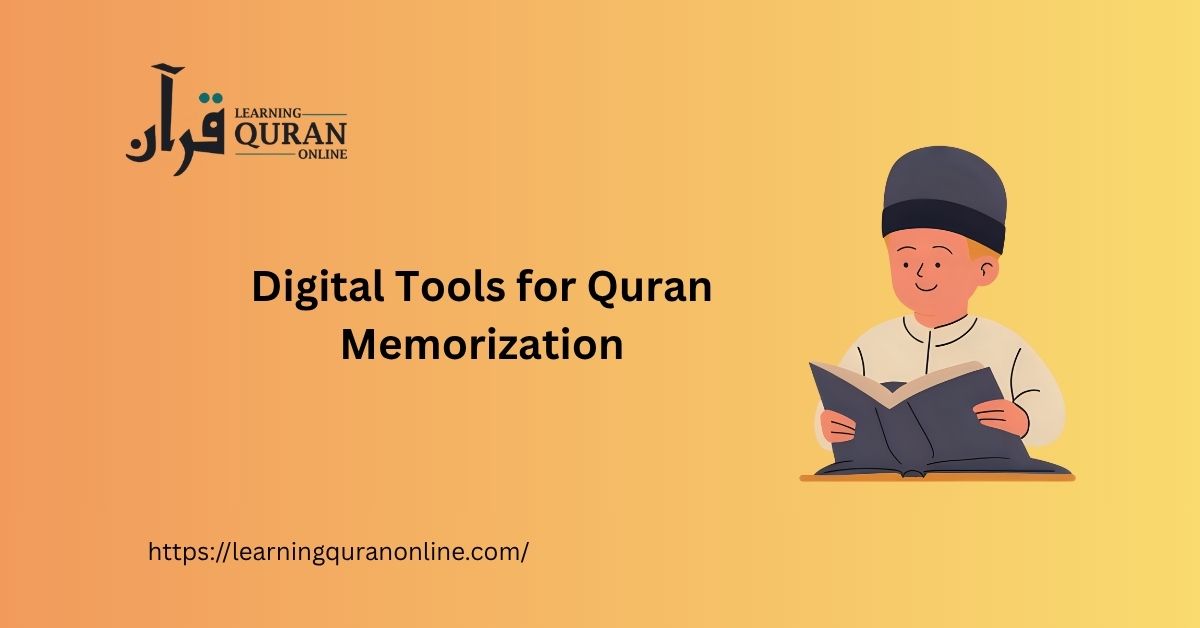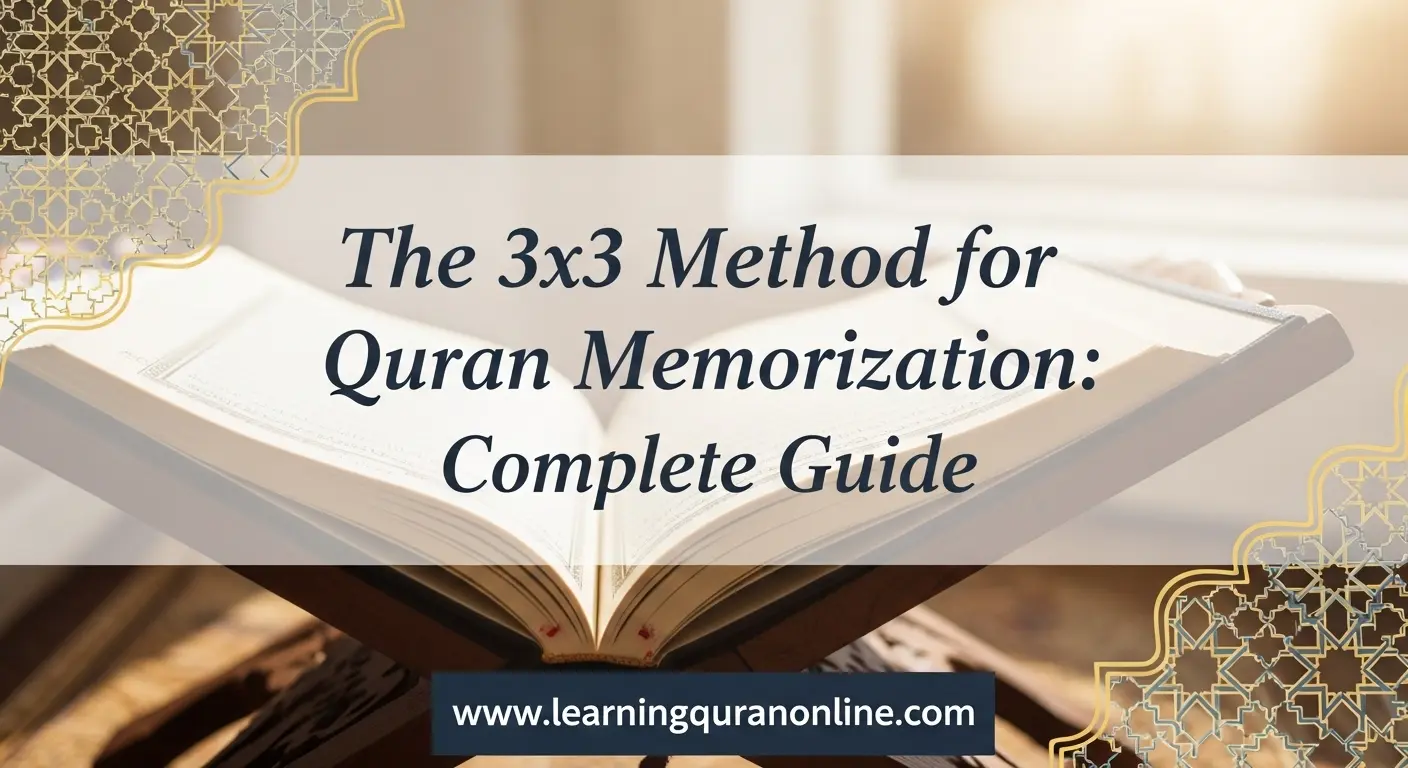Table of Contents
ToggleWhy Use Digital Tools for Quran Memorization?
Digital tools are not a replacement for an experienced teacher, but they amplify your memorization process. They provide:
- Structured memorization plans and study schedules for daily revision and long-term goals.
- Audio recitations from multiple qaris (reciters) to perfect pronunciation and tajweed rules.
- Spaced repetition systems (SRS) and flashcards to retain verses longer and reduce forgetting.
- Progress tracking, reminders, and analytics to build consistency and accountability.
- Portable access — smartphone, tablet, or web — so you can review anywhere, anytime.
Quran Memorization Techniques for Non-Arabic Speakers
Key Features to Look for in Quran Memorization Apps and Software
When choosing a digital Quran memorization tool, check for features that support both memorization and recitation quality:
- Ayah-by-Ayah Playback: Loop individual verses for repetitive listening and shadowing.
- Multiple Qaris: Ability to switch between different reciters to learn proper pronunciation and melody.
- Audio Speed Control: Slow down recitation to learn tajweed and phonetics.
- Spaced Repetition (SRS) / Flashcards: Built-in systems like Leitner, Anki decks, or SuperMemo-style scheduling.
- Transliteration & Translation: Support for transliteration to help non-Arabic speakers and translations for understanding.
- Tajweed Markings & Lessons: Visual tajweed rules and corrective tips within the text.
- Recitation Feedback: Voice recognition or AI-powered feedback to correct your pronunciation.
- Progress Tracker & Reminders: Daily goals, streaks, and notifications to maintain a memorization schedule.
- Offline Mode: Download surahs for offline listening and review.
- Bookmarking & Notes: Tag verses, leave personal notes, and mark difficult ayahs for focused review.
Popular Types of Digital Tools for Hifz
There are several categories of digital tools that learners use to memorize the Quran. Here are the most effective ones:
1. Quran Memorization Apps
These mobile apps are designed specifically for memorization. They often combine audio loops, verse-by-verse repetition, and memorization schedules. Many offer community features and the ability to connect with teachers. Search keywords: “Quran memorization apps”, “hifz app”, “memorize Quran app”.
2. Spaced Repetition Systems (SRS) & Flashcards
SRS platforms like Anki or built-in SRS in hifz apps schedule reviews at optimal intervals to increase long-term retention. You can create decks for ayahs, tajweed rules, or translations. Keywords: “spaced repetition for Quran”, “SRS Quran flashcards”, “Anki Quran decks”.
3. Audio Libraries and Recitation Tools
Audio-focused tools provide multi-reciter libraries, slow playback, and loop features for perfecting pronunciation. These tools are essential for learners practicing tajweed and phonetics. Keywords: “Quran audio recitation”, “ayah loop”, “qari recitation”.
How to Retain Memorized Quran Online
4. Online Platforms & Web Tutors
Online Quran academies and platforms connect you with qualified tutors for guided memorization, assessment, and tajweed correction via video calls. Keywords: “online Quran tutor”, “virtual hifz classes”, “Quran memorization course“.
Top Features and Tools — Practical Examples
Here are concrete features and how they help with daily memorization:
- Verse Loop & Playlists: Create a playlist of difficult ayahs for focused muraja’ah during commute or free time.
- Study Plan Generator: Auto-generate a memorization timetable that breaks surahs into manageable daily portions.
- Recitation Recording: Record your recitation, compare with a qari, and track improvements over time.
- Visual Tajweed Highlights: Color-coded tajweed rules in the mushaf (script) help you apply rules while memorizing.
- Accountability Groups: Join online hifz groups to share progress, set challenges, and maintain motivation.
Memorization Techniques Supported by Digital Tools
Digital tools complement proven memorization methods. Combine tech with these techniques for best results:
- Spaced Repetition: Use SRS to schedule reviews — newly memorized verses get reviewed more frequently, then at increasing intervals.
- Chunking: Break surahs into small chunks (3–5 ayahs) and use loop playback until fluent.
- Active Recall: Recite from memory before checking the app. Use flashcards that prompt you to recall the next ayah.
- Shadowing: Listen to a reciter and recite aloud immediately after, matching pronunciation and rhythm.
- Interleaving: Mix older revisions with new memorization to strengthen retrieval across contexts.
House of Quran Memorization Tool Guide
How to Choose the Best Tool for Your Hifz Journey
Not every app fits every learner. Consider the following when selecting a digital Quran memorization tool:
- Learning Stage: Beginners may need tajweed lessons and transliteration, while advanced memorizers might prefer SRS and recitation feedback.
- Teacher Access: If you need correction, pick platforms with tutor access or live review options.
- Device Compatibility: Ensure the app works on your phone (iOS/Android) and has offline capabilities.
- Privacy & Data: Check how your recordings and progress data are stored and protected.
- User Reviews: Look for testimonials about recitation feedback, ease-of-use, and reliability.
Common Pitfalls & How to Avoid Them
Technology helps, but misuse can slow progress. Watch out for:
- Over-reliance on Playback: Constant listening without active recitation limits retention — always combine listening with spoken practice.
- Skipping Tajweed: Memorizing without proper tajweed can lead to incorrect recitation. Use tajweed-enabled tools or teacher correction.
- Inconsistent Schedules: Digital reminders are useful, but discipline is still required. Set realistic daily goals and stick to them.
- Too Many Tools: Using multiple apps can fragment your progress tracking. Choose a primary tool and supplement only when necessary.
Practical Daily Routine Using Digital Tools
Here’s a simple daily workflow combining apps, SRS, and tutor feedback:
- Warm up with 5–10 minutes of tajweed practice using an instructional video or tajweed app.
- Listen to the target ayah(s) from multiple qaris at slow speed, then at normal speed.
- Recite aloud and record your recitation using the app’s recorder or your phone. Compare with a qari.
- Add the memorized ayahs to your SRS deck for scheduled review.
- Use the app’s revision playlist to review previously memorized portions (15–30 minutes).
- If possible, meet weekly with a tutor or upload a recording for feedback on tajweed and fluency.
Complete Guide to Online Quran Memorization
The Future: AI and Voice Recognition in Quran Memorization
Emerging technologies like AI-driven pronunciation analysis and machine learning are starting to offer automated tajweed correction and personalized study recommendations. These features analyze your recitation, highlight errors in articulation, and suggest targeted practice — bridging the gap between self-study and teacher-led correction.
Conclusion — Blend Tradition with Technology
Digital tools for Quran memorization are powerful allies when used thoughtfully. They speed up learning, support long-term retention through spaced repetition, and provide flexible access to recitations and corrective feedback. Yet, they work best when combined with a qualified teacher and consistent daily effort. Choose an app or platform that matches your stage, leverage SRS and audio tools, and build a realistic memorization schedule. With the right balance, technology can transform your hifz journey into a structured, measurable, and spiritually fulfilling path.
Ready to start? Explore a few highly rated Quran memorization academy apps and experiment with SRS flashcards today — set a small daily goal, and let digital tools help you achieve it step by step, ayah by ayah.
















